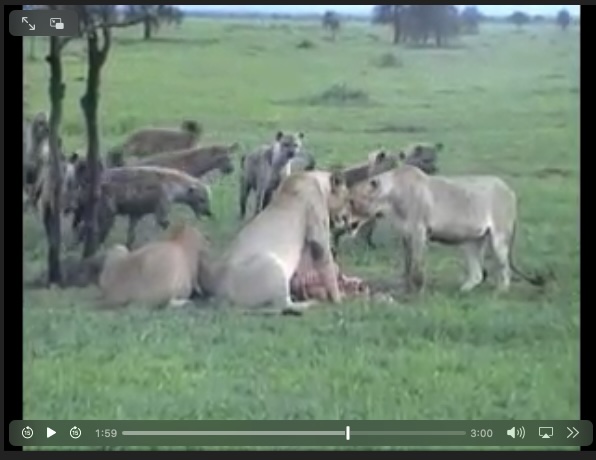The spotted hyena of Eastern Africa can engage in sophisticated cooperation to overcome a more powerful predator, the lion. This mobbing behavior is much more complex than the hyenas’ usual cooperative behaviors, and may illustrate an evolutionary breakthrough in action.
The video below shows how a few hyenas first come across the lions at a kill, then make vocalizations to attract more hyenas to the area, excite each other through further vocalization, touching, and gestures, and eventual form a mob that jumps the lions and chases the lions away from the kill.

This behavior was simulated in neuroevolution experiments, illustrated in the videos below. They show a 100x100 simulated toroidal grid world; the orange sphere is a lion agent and the green cubes are ten hyena agents. Since the simulation environment is toroidal, agents that exit from the left immediately enter from the right, and vice-versa. Similarly, agents that exit from the bottom reenter from the top and vice-versa.
Initially there are many risk takers (that walk straight to the lion) and risk-evader (that stay away from the lion). The video below demonstrates both, and in the end an accidental case of successful mobbing (when four risk-takers approach the lion simultaneously): the lion is driven away from the kill site. In simulation, we can discover hyena behaviors that form stepping stones that make it possible to eventually evolve mobbing as an intentional behavior.
In the below video, the orange agent is a risk-taker that walks straight in and gets eliminated. The red one is a risk-evader that stops at the circle, but doesn't understand when it should step in. As a result, even though the blue agents coordinate their attack, they get killed because the red agent doesn't join them. This video illustrates the stepping stones from which successful mobbing behavior can be built through evolution.
The below video illustrates successful coordinated mobbing; the blue agents move to the circle, and when there's enough of them, mob the lion. Note also a successful risk-evader strategy (green agent). It hangs back until the lion has been mobbed, and then joins the feast when it is safe to do so (receiving a lower reward). These behaviors persist in prolonged evolution, and thus serve not only as stepping stones, but also as reservoirs of behaviors for maintaining mobbing in the long run.